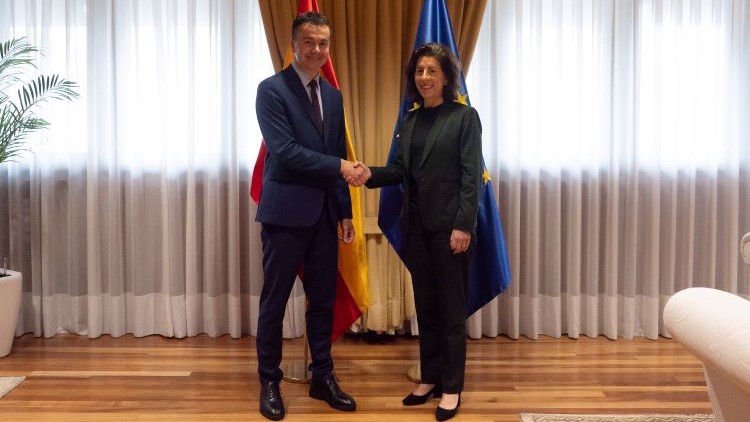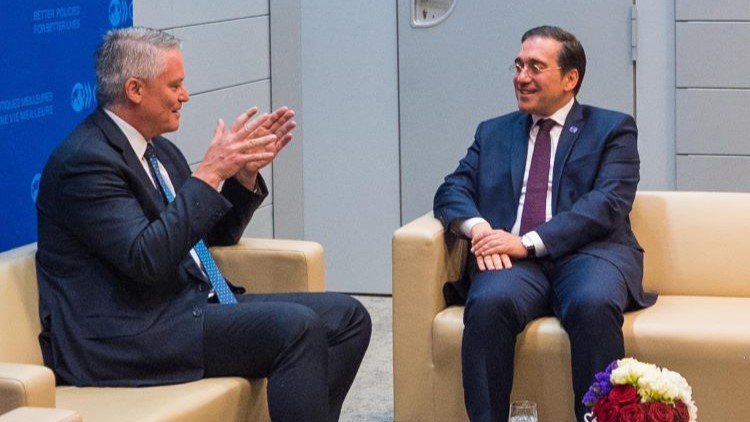The Diplomat
The Minister of Industry, Trade and Tourism, Hector Gómez, received yesterday at the Ministry to the U.S. Secretary for Trade, Gina Raimondo, whom he urged to find a “prompt solution” to the dispute between the two countries by U.S. tariffs on Spanish black olives.
During the meeting, Gómez explained to Raimondo -who was later received by the President of the Government, Pedro Sánchez- Spain’s priorities during the next rotating Presidency of the Council of the European Union, with special attention to the strengthening of the EU’s trade relations with the USA and to the progress in the pending trade agreements between the EU and Latin American countries, specifically Chile, Mexico and Mercosur, so that “the signing and subsequent definitive entry into force of these agreements takes place as soon as possible”.
The Minister also praised the US commitment to the reform of the World Trade Organization (WTO) and assured that, during the Spanish Presidency of the EU, a new approach will be proposed to undertake the reform of the organization and the strengthening of the multilateral trade system with a view to the 13th WTO Ministerial Conference, to be held in February 2024.
Gina Raimondo was later received by the President of the Government, Pedro Sánchez, at the Moncloa Palace to discuss trade and technology issues in the run-up to the Spanish Presidency. During the meeting, both agreed on the need to move quickly towards a joint roadmap to regulate and reduce the risks of Artificial Intelligence and discussed the strengthening of collaboration between the US and Spain in the development of the semiconductor value chain. They also exchanged views on international trade and preparations for the upcoming EU-CELAC summit.
Black olives
At the bilateral level, Héctor Gómez reiterated before the US Secretary of Commerce the Spanish position on the tariffs imposed by the US on Spanish black table olives and urged his US counterpart to find a prompt solution to this issue and thus “crown the fantastic bilateral relations that we have strategically and also politically, economically and culturally with the United States”.
The issue of the olives was discussed last May 12 during the meeting between Pedro Sánchez and the President of the United States, Joe Biden, at the White House. According to Sánchez, it is “a dispute created by the previous Trump Administration”, which “is in the hands of the WTO, which has been clear on this matter”, and in which “I have found receptivity on the part of the Biden Administration to resolve it”.
In August 2018, the United States imposed tariffs of 35% on black olives from Spain on the grounds that the Common Agricultural Policy (CAP) aid to the Spanish black olive sector was illegal and represented “unfair competition” to California producers. The measure has had a very negative impact on Spanish exports to the US that has resulted, according to the Spanish employers’ association of the sector, in losses of up to 170 million euros.
In January 2019, the European Commission, at the request of the Spanish Government, decided to request consultations with the USA before the World Trade Organization. Because these consultations were unsuccessful, in May of that year the EU requested the WTO to create a panel to investigate the anti-dumping and anti-subsidy measures imposed by the United States. Despite Washington’s blockade, the WTO established a panel in June of the same year to study this matter.
Finally, in November 2021, the WTO made public the Panel’s Final Report, which ruled that the U.S. measures are “inconsistent” with the WTO’s own rules and urged Washington to eliminate the duties. As a result of this ruling, the United States made a commitment to the EU to bring its legislation into line by January 14, 2023. However, not only was this commitment not fulfilled, but in September 2022, the U.S. Court of International Trade again questioned the EU’s agricultural subsidies and ruled in favor of imposing the tariff on Spanish black olives. Following this ruling, the Spanish government urged the European Commission to take the United States back to the WTO.
“Bilateral relations with the United States are excellent, as evidenced by the recent visit of President Pedro Sánchez to the White House or the continuous holding of sectoral meetings. We hope, therefore, that these measures, which do not protect Californian production either, will be reconsidered,” said Héctor Gómez yesterday.







